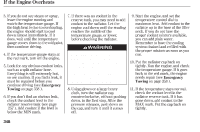2010 Honda Civic Owner's Manual - Page 350
2010 Honda Civic Manual
Page 350 highlights
If the Engine Won't Start Nothing Happens or the Starter Motor Operates Very Slowly When you turn the ignition switch to the START (III) position, you do not hear the normal noise of the engine trying to start. You may hear a clicking sound, a series of clicks, or nothing at all. Check these things: Check the transmission interlock. If you have a manual transmission, the clutch pedal must be pushed all the way to the floor or the starter will not operate. With an automatic transmission, it must be in Park or neutral. Turn the ignition switch to the ON (II) position. Turn on the headlights, and check their brightness. If the headlights are very dim or do not come on at all, the battery is discharged. See Jump Starting on page 345 . Turn the ignition switch to the START (III) position. If the headlights do not dim, check the condition of the fuses. If the fuses are OK, there is probably something wrong with the electrical circuit for the ignition switch or starter motor. You will need a qualified technician to determine the problem. See Emergency Towing on page 358 . If the headlights dim noticeably or go out when you try to start the engine, either the battery is discharged or the connections are corroded. Check the condition of the battery and terminal connections (see page 333 ). You can then try jump starting the vehicle from a booster battery (see page 345 ). The Starter Operates Normally In this case, the starter motor's speed sounds normal, or even faster than normal, when you turn the ignition switch to the START (III) position, but the engine does not run. Are you using a properly coded key? An improperly coded key will cause the immobilizer system indicator in the instrument panel to blink rapidly (see page 78 ). Are you using the proper starting procedure? Refer to Starting the Engine on page 270 . Do you have fuel? Check the fuel gauge; the low fuel indicator may not be working. There may be an electrical problem, such as no power to the fuel pump. Check all the fuses (see page 352 ). If you find nothing wrong, you will need a qualified technician to find the problem. See Emergency Towing on page 358 . 344
















